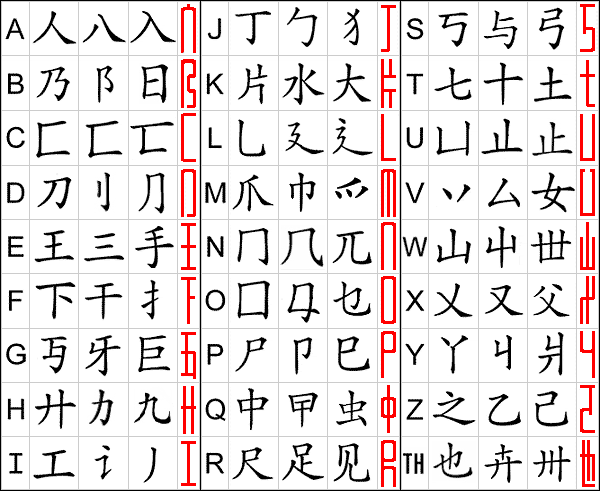
The Square Word Calligraphy system presented on this page and developed by Dr. David B. Kelley in 2012 is a new version of the original Square Word Calligraphy (英文方块字) system developed in 1994 by the Chinese artist, Xu Bing (徐冰).
Xu Bing attempted to fuse written English and written Chinese. He designed a system whereby English words are written in the format of a square, so as to resemble the consistent size of all Chinese characters. To achieve this, he utilized the fact that some of the 214 different radicals (component parts) used to write Chinese characters also resemble the letters in the Roman alphabet. Based on the similarities of certain of the Chinese radicals and the Roman alphabet, Xu Bing created his own Sino-Roman alphabet. Using those Sino-Roman symbols, he began to write English words by combining the letters of individual English words into squares, with all the letters of any English word present, but formatted into a square shape. Modern Korean writing does this with the 24 letters of the Hangul alphabet. The result is a Chinese-like grouping of symbols into single "characters" (or English "words") of the same size.
David's version of Square Word Calligraphy differs from the original system by creating a different set of symbols from the 214 radicals, thus forming a different Sino-Roman alphabet. David's alphabet uses different symbols because he thought that eleven of Xu Bing's original Sino-Roman alphabetic symbols could be improved by replacing them with more Chinese-like ones, specifically the symbols for "A", "D", "E", "F", "H", "K', "M", "Q", "R", "V" and "Z". David's goal is to aim for a more consistently Chinese-like appearance to SWC words.
Both Xu Bing's and David's versions initially appear indecipherable to English speakers; however, once they see the alphabet chart, they can read everything easily. Yet, many people say they feel really strange because of the sudden complete awareness of comprehension, after being so sure it was unreadable. Use the Sino-Roman alphabet chart below and see for yourself whether you can read the example text, and how quickly.

Information about Xu Bing and his calligraphy
http://www.xubing.com
http://www.xubing.com/index.php/site/texts/xu_bings_square_work_calligraphy/
http://www.xubing.com/index.php/site/projects/year/1994/square_calligraphy_classroom
Enganagri, Keltic, Six-Color Alphabet, 6-Color Binary Alphabet, Square Word Calligraphy
Constructed scripts for: Ainu | Arabic | Chinese languages | Dutch | English | Hawaiian | Hungarian | Japanese | Korean | Lingala | Malay & Indonesian | Persian | Tagalog / Filipino | Russian | Sanskrit | Spanish | Taino | Turkish | Vietnamese | Welsh | Other natural languages | Colour-based scripts | Tactile scripts | Phonetic/universal scripts | Constructed scripts for constructed languages | Adaptations of existing alphabets | Fictional alphabets | Magical alphabets | A-Z index | How to submit a constructed script
[top]
You can support this site by Buying Me A Coffee, and if you like what you see on this page, you can use the buttons below to share it with people you know.

If you like this site and find it useful, you can support it by making a donation via PayPal or Patreon, or by contributing in other ways. Omniglot is how I make my living.
Note: all links on this site to Amazon.com, Amazon.co.uk
and Amazon.fr
are affiliate links. This means I earn a commission if you click on any of them and buy something. So by clicking on these links you can help to support this site.
[top]